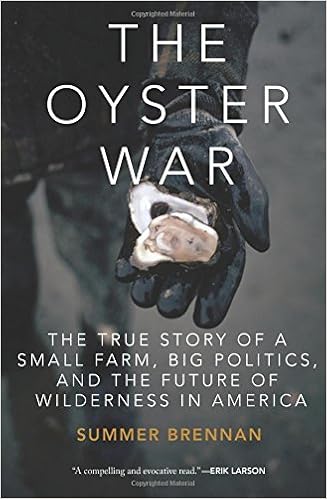Hard cases might make bad law but they can teach us to ask better questions.

The Oyster War: The True Story of a Small Farm, Big Politics, and the Future of Wilderness in America by Summer Brennan tells the story of farming oysters (introduced from other parts of the world) in California and in doing so breaks open some of the important questions surrounding how we think about wild places.
Disclosure: I am still waiting to read the book. I followed the story from a distance as it unfolded. From what I have learned since, I never fully appreciated the passion involved closer to the action.
I highly recommend the podcast of an interview with the author found here or a review of the book here.
Romantic ideas about native and non-natives may have a place in small prairies and preserves, but Mediterranean grasses came to California with the first Spanish cattle, violets and bluebells grow alongside native flowers.
Romantic ideas about returning areas to their pre-contact wildness are also questioned. Native Americans managed the area in their own way, burning brush and managing prairie to support the local elk population.
Dairymen and cattle farmers were protected when the Point Reyes Wilderness Act became law, the lone oyster farm was not. Life is sometimes like that.
However we define our ecological goals, they are bound to contain much that is arbitrary and artificial. We are living in the Anthropocene and human beings are arbitrary. As a product of evolution ourselves, though, I guess what we do is not technically "artificial" at least no more artificial than the transformation any other invasive species places on its environment.
Meh... I digress.
To the point, ecology is not something static across millennium but is always and has always been in flux. If it has reached a new equilibrium, that should have some value. If we want to alter the equilibrium or bend it in a new way, that can have value as well.
Let us be honest about this, we are making human decisions based upon human values and sometimes all we
are doing is pitting the value kayakers place upon an undisturbed ascetic against the value a farmer place upon local place or localvores place on low food-mile oysters. The science suggests oysters did no harm to the ecology of the place but the idea of farmers in the wilderness ran counter to some perceptions of wilderness.
My reading of the story is that there was enough fault to go around. Everybody was right. Everybody was wrong. If you have too strong of an opinion on the matter, it is operating as a Rorschach test and telling me more about your internal life than the truth of the matter.
Eventually, however, a society just needs to make a decision.
As someone who is a little bit more concerned with eating than the appearance of an untamed-ness, my sympathies lie with the oyster farmers. Legally, it appears as if the park service was well within its rights to end the lease of the oyster farmers, despite the fact that science could show no harm was being done.


No comments:
Post a Comment